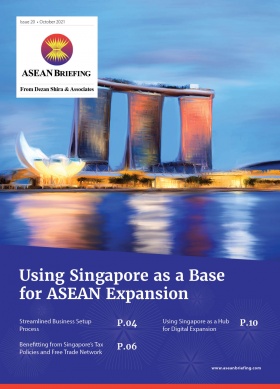Electric Vehicles in Malaysia: Tax Incentives for Owners and Manufacturers
As of January 2022, electric vehicle (EV) producers in Malaysia can enjoy a variety of tax incentives, which include tax exemptions for imports, excise, and sales. Further, consumers can also claim tax relief for owning an electric vehicle. The government hopes that the incentives will attract more EV producers to establish their manufacturing hub in Malaysia and develop a domestic EV assembly industry.
Buying electric vehicles (EVs) in Malaysia has become more affordable following the new tax incentives that came into force at the start of the year.
As of January 1, 2022, EV producers can benefit from a variety of tax exemptions, including on imports, excise, and sales. For their part, consumers can claim tax relief for owning an EV as part of the government’s efforts to lower the cost of adoption of zero-emission vehicles.
The drive to encourage EVs in Malaysia reflects the government’s goals to cut down on carbon emissions while retaining the competitiveness of the country’s automotive industry. Foreign investors in Malaysia will find a relatively nascent EV ecosystem, but a strong automotive sector in place to capture growth opportunities as the industry adapts.
What are the tax incentives?
Malaysia’s EV tax incentives apply to three categories: imports, local assembly, and individual owners. They only apply to full EV vehicles and exclude hybrid vehicles.
The incentives are as follows:
- Imports: Imported (CBU) EVs have full import and excise duty exemptions until the end of 2023.
- Local assembly: Locally assembled (CKD) have full import and excise duty exemptions, and a sales and service tax (SST) waiver until the end of 2025.
- Owners: EV owners are exempted from road tax and can claim a personal tax exemption of up to 2,500 ringgit (US$571) for costs relating to EV charging hardware and services, including the purchase, installation, rental, and subscription fees of EV charging facilities, until the end of 2023.
The above tax incentives are effective as of January 1, 2022, except for the road tax exemption for owners, which came into force on February 15, 2022.
The most generous tax incentives apply to local assembly, as this category is exempt from all SST. However, all imported passenger vehicles in Malaysia currently enjoy a 50 percent reduction in SST as part of a separate incentive to boost the automotive industry, lowering the SST rate from 10 percent to 5 percent until June 30, 2022.
Currently, all EVs in Malaysia are imported and there is no local assembly, meaning there are no eligible recipients of the local assembly incentives. Policymakers hope that the greater incentives for local assembly will change this and lead to the development of a domestic EV assembly industry.
Transforming Malaysia’s auto industry
Malaysia’s auto industry is a significant component of the country’s manufacturing sector. Malaysia is the third-largest automotive market in ASEAN and its automotive industry contributes 4 percent to GDP, according to the Malaysian Investment Development Authority. Currently, Malaysia has 28 manufacturing and assembly plants for various types of vehicles, and automotive parts and components.
Malaysia’s EV ecosystem is significantly less developed than the broader automotive industry, both in terms of manufacturing and consumption. However, promoting EVs is an increasing priority for the government, particularly following its pledge in the 12th Malaysia Plan for 2021-2025 to become carbon neutral by 2050 at the earliest.
Barriers to developing the EV ecosystem in Malaysia include high costs and inadequate supporting infrastructure. As an upper-middle-income country with a population of 32 million, Malaysia does not have an extremely sizeable market for EVs, which are prohibitively expensive for much of the population. Currently, the cheapest EV model available in Malaysia costs about twice the annual salary of a middle-income household.
Further, Malaysia’s EV infrastructure is lacking, such to its dearth of EV charging stations. Currently, Malaysia only has about 600 EV charging stations. Recognizing the need, Malaysia’s government pledged to build 10,000 EV charging stations by 2025 in collaboration with the private sector, per the Low Carbon Mobility Blueprint 2021-2030. Companies that contribute to building EV infrastructure in Malaysia will benefit from government incentives, such as tax breaks.
Developing an EV industry
While Malaysia’s EV industry is at an early stage, it is well-placed to develop. Malaysia is also strong in input industries that are needed for EV production, such as semiconductors and copper wire manufacturing.
In 2021, GCG Asia, an automotive components supplier, announced plans to set up EV battery manufacturing in Malaysia to serve supply chains in Southeast Asia. As investments in Malaysia’s EV industry gain momentum and the government continues to offer supportive incentives, other companies may follow suit, making Malaysia a leader in Southeast Asia’s adoption of EVs.
About Us
ASEAN Briefing is produced by Dezan Shira & Associates. The firm assists foreign investors throughout Asia and maintains offices throughout ASEAN, including in Singapore, Hanoi, Ho Chi Minh City, and Da Nang in Vietnam, Munich, and Essen in Germany, Boston, and Salt Lake City in the United States, Milan, Conegliano, and Udine in Italy, in addition to Jakarta, and Batam in Indonesia. We also have partner firms in Malaysia, Bangladesh, the Philippines, and Thailand as well as our practices in China and India. Please contact us at asia@dezshira.com or visit our website at www.dezshira.com.






